capitalism
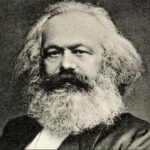
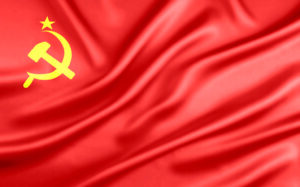 There are a number of different kinds of governments, and people disagree on which is the best. Personally, I think that any government that takes away the freedoms of its people is destined to fail. Communism is a “political theory derived from Karl Marx, advocating class war and leading to a society in which all property is publicly owned, and each person works and is paid according to their abilities and needs.” Communism is also, known as Marxism, which is defined as “the political and economic theories of Karl Marx and Friedrich Engels, later developed by their followers to form the basis for the theory and practice of communism.” I don’t think most people know the real meaning of Marxism or Communism, or, for that matter, Socialism, which is “a political and economic theory of social organization which advocates that the means of production, distribution, and exchange should be owned or regulated by the community as a whole.” If people knew what these types of governments are really like, they would fight to keep them out of their countries. The problem is that people think the government will take care of them, and that they will benefit from the work of others. It never works that way. everyone in these situations gets poorer, except for the government.
There are a number of different kinds of governments, and people disagree on which is the best. Personally, I think that any government that takes away the freedoms of its people is destined to fail. Communism is a “political theory derived from Karl Marx, advocating class war and leading to a society in which all property is publicly owned, and each person works and is paid according to their abilities and needs.” Communism is also, known as Marxism, which is defined as “the political and economic theories of Karl Marx and Friedrich Engels, later developed by their followers to form the basis for the theory and practice of communism.” I don’t think most people know the real meaning of Marxism or Communism, or, for that matter, Socialism, which is “a political and economic theory of social organization which advocates that the means of production, distribution, and exchange should be owned or regulated by the community as a whole.” If people knew what these types of governments are really like, they would fight to keep them out of their countries. The problem is that people think the government will take care of them, and that they will benefit from the work of others. It never works that way. everyone in these situations gets poorer, except for the government.
The Union of Soviet Socialist Republics (USSR) was established in post-revolutionary Russia, on December 30, 1922. It combined Russia, Belorussia, Ukraine and the Transcaucasian Federation (which was divided in 1936 into the Georgian, Azerbaijan and Armenian republics). The new nation was also known as the Soviet Union. It was the successor to the Russian Empire and the first country in the world to be based on Marxist socialism. The rest of the world was rather stunned that this kind of regie actually existed, because it took away so many freedoms and personal property, and the people had no choice.
Because Russia was reeling from the Russian Revolution of 1917 and subsequent three-year Russian Civil War, the Bolshevik Party under Vladimir Lenin dominated the soviet forces. A coalition of workers’ and soldiers’ committees called for the establishment of a socialist state in the former Russian Empire. It was from there that the USSR was formed, and after that, all levels of government were controlled by the Communist Party, and the party’s Politburo, with its increasingly powerful general secretary, who effectively ruled the country. Everything, from Soviet industry was owned and managed by the state, and agricultural land was immediately confiscated and divided into state-run collective farms.
Over the coming decades, the Russian-dominated Soviet Union grew into one of the world’s most powerful and influential states. It eventually encompassed 15 republics…Russia, Ukraine, Georgia, Belorussia, Uzbekistan, Armenia, Azerbaijan, Kazakhstan, Kyrgyzstan, Moldova, Turkmenistan, Tajikistan, Latvia, Lithuania and Estonia. 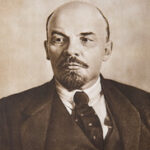
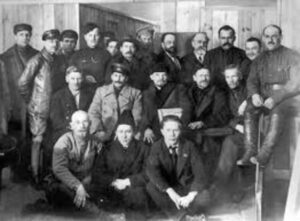 The USSR, as many knew it must, eventually failed because you can’t place people into a slave state without eventual rebellion. In 1991, the Soviet Union was dissolved following the collapse of its communist government. Communism, Marxism, and Socialism simply won’t work in the long run. If a nation wants growth and prosperity, they must have capitalism, so that the people have the incentive to be entrepreneurs, inventors, scientists, and so many other occupations in which discovery is made. Without incentive, people will simply quit.
The USSR, as many knew it must, eventually failed because you can’t place people into a slave state without eventual rebellion. In 1991, the Soviet Union was dissolved following the collapse of its communist government. Communism, Marxism, and Socialism simply won’t work in the long run. If a nation wants growth and prosperity, they must have capitalism, so that the people have the incentive to be entrepreneurs, inventors, scientists, and so many other occupations in which discovery is made. Without incentive, people will simply quit.
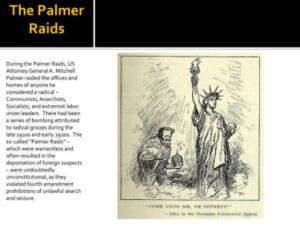 There has been a lot of talk in the news lately about Capitalism verses Socialism or Communism. Capitalism is clear-cut from the other ideologies, but the same cannot be said about communism and socialism. Socialism and communism are often used in place of each other despite being fundamentally different from each other. Capitalism puts the control of one’s assets in the hands of the individual, while socialism and communism put all or most assets in the hands of the government to hand out…or not…as they see fit. In my opinion, the government agencies we have really haven’t done such a great job that I would want to go back and give them more power and control.
There has been a lot of talk in the news lately about Capitalism verses Socialism or Communism. Capitalism is clear-cut from the other ideologies, but the same cannot be said about communism and socialism. Socialism and communism are often used in place of each other despite being fundamentally different from each other. Capitalism puts the control of one’s assets in the hands of the individual, while socialism and communism put all or most assets in the hands of the government to hand out…or not…as they see fit. In my opinion, the government agencies we have really haven’t done such a great job that I would want to go back and give them more power and control.
These days there are many people who would like to switch to Socialism or Communism, but I think it’s because they don’t understand these ideologies. The United States used to understand them very well, and when some of the immigrants tried to bring Socialism and Communism into this counter, in late 1919, and into January 1920, President Woodrow Wilson directed the United States Department of Justice to carry out a series of raids to capture, arrest, and deport these immigrants, because they should never be allowed to come to our 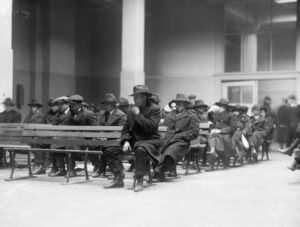 country and they try to change it in the country they chose to leave…especially because the reason they left was because it wasn’t working in their country.
country and they try to change it in the country they chose to leave…especially because the reason they left was because it wasn’t working in their country.
These raids were called the Palmer Raids. The primary targets were Italian immigrants and Eastern European Jewish immigrants with alleged leftist ties, with particular focus on Italian anarchists and immigrant leftist labor activists. Attorney General A Mitchell Palmer spearheaded the operation, and the result was that 3,000 people were arrested. Of the 3,000 arrested, 556 foreign citizens were deported, including a number of prominent leftist leaders.
As often happens in government, what one department likes another doesn’t, so Palmer’s efforts were largely frustrated by officials at the US Department of Labor, which had authority for deportations. They apparently objected to Palmer’s methods. The Palmer Raids during the time of the First Red Scare, a period of fear of and reaction against communists in the US in the years immediately following World War I and the Russian Revolution…the Cold War era. The Palmer Raids were strikes that garnered national attention, and prompted race riots in more than 30 cities, as well as two sets of bombings in April and June 1919, including one bomb mailed to Palmer’s home. Whether the methods were good or bad, I agree that no immigrants should ever 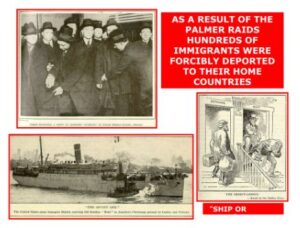 expect to come into this country and then fundamentally change how we run things until it becomes just like the nation that they worked so hard to escape.
expect to come into this country and then fundamentally change how we run things until it becomes just like the nation that they worked so hard to escape.
Unfortunately, Palmer’s raids became the subject of public criticism and led to the rise of the ACLU. Because very little evidence of terrorist bombs was uncovered during the raids, and people were held without legal representation, and some of the raids were carried out without search warrants, the whole operation took on a bad light, even if some of those who were arrested and deported were, in fact, terrorists.
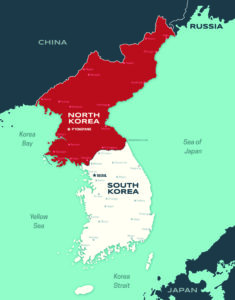 When the nations of North and South Korea were split, it was much like when Germany became East and West Germany…people were caught in the crossfire…so to speak. Despite being unified off and on for nearly 1,500 years, the Korean peninsula was divided into North and South as a result of the breakup of the Japanese empire at the end of World War II. The United States government knew that it would have to administer the Philippines, as well as Japan itself. It was a big job, so the United States was reluctant to also take trusteeship of Korea. Basically, Korea just wasn’t a very high priority for the United States. The Soviets, on the other hand, were more than willing to step in and take control of lands that the Tsar’s government had relinquished its claim to after the Russo-Japanese War (1904–05).
When the nations of North and South Korea were split, it was much like when Germany became East and West Germany…people were caught in the crossfire…so to speak. Despite being unified off and on for nearly 1,500 years, the Korean peninsula was divided into North and South as a result of the breakup of the Japanese empire at the end of World War II. The United States government knew that it would have to administer the Philippines, as well as Japan itself. It was a big job, so the United States was reluctant to also take trusteeship of Korea. Basically, Korea just wasn’t a very high priority for the United States. The Soviets, on the other hand, were more than willing to step in and take control of lands that the Tsar’s government had relinquished its claim to after the Russo-Japanese War (1904–05).
The Soviets wanted to set the country up as communist, and the United States wanted the country to be capitalist. The sad truth about the difference between communism and capitalism is that capitalism is about freedom, and communism is about slavery. The country was divided along the 38th parallel with a demilitarized zone along that line. The North Korean side of the 38th Parallel was ruled by communism, and the South was ruled by Capitalism. The economic impact was most unfortunate, in that two separate and “necessary to each other” industrial areas were now on 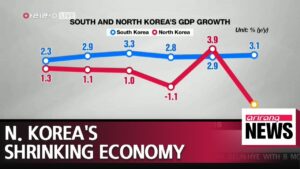 opposite sides. The two countries were now both poor.
opposite sides. The two countries were now both poor.
That was a sad state of affairs, but the worse state of affairs was what happened to the people. Communism being what is was, worried that if the people were allowed to cross the borders freely, they would not come back, and they were probably right. So the people who lived in North Korea and had family in South Korea were no separated from each other, and those in the south were equally separated from loved ones. It is a horrible situation, but there seemed to be no remedy for it. The separation went on for many years. Finally on October 31, 2010, the North Korean government relented to a degree. Four hundred and thirty-six South Koreans were allowed to spend three days in North Korea to meet their 97 North Korean relatives, whom they had been separated from since the 1950-1953 war. The three-day reunion was wonderful, but also bittersweet, because it was followed by a sad goodbye. The separation had been excruciating, and they had no recourse. They were at 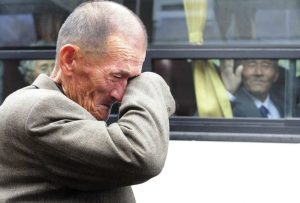 the mercy of the ruling government. Nevertheless, they were also thankful for the time to spend together, even if it meant a tearful goodbye following a luncheon meeting during inter-Korean temporary family reunions at Mount Kumgang resort.
the mercy of the ruling government. Nevertheless, they were also thankful for the time to spend together, even if it meant a tearful goodbye following a luncheon meeting during inter-Korean temporary family reunions at Mount Kumgang resort.
When you look at the realities of Socialism, Marxism, and Communism, you cannot really be surprised by the many people who are trying to escape from it’s grip. Most are willing to give their life to get out in the hope of giving their children a better life than that. Many lessons could be learned from the situation between North and South Korea, if we will only pay attention.

